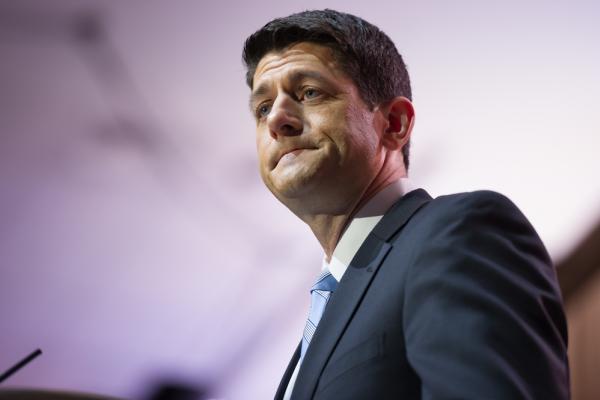If House Speaker Paul Ryan truly wants to promote a “compassionate conservative” agenda that counters the divisive rhetoric of the presumptive Republican presidential nominee Donald Trump, Ryan should follow the example of one man: Pope Francis.
Poll after poll consistently shows two thirds of Americans have a negative view of Trump. Contrast Trump’s numbers with Pope Francis, who enjoys negativity numbers in the low 20s and even has a net favorability among self-described members of the Tea Party. In what should be a warning sign for Ryan and the GOP, a recent poll shows Trump is struggling among white males, a demographic which historically supports Republicans.
Pope Francis, with his deep devotion to fighting for the poor, sick, and marginalized, could be a natural ally for the newly installed Speaker of the House and fellow Catholic. Ryan himself has professed a desire to "treat not just the symptoms of poverty, but the root causes of poverty, so that we can eradicate poverty." Whether Ryan embraces the evangelizing message of Pope Francis and the Catholic Church in his crusade fight poverty is yet to be seen.
During a speech in March, Ryan said he was wrong for using the phrase “makers and takers” to describe those on government benefits. Go back further to the 2012 election, and Ryan claimed he aligns less with the teachings of the outspoken atheist libertarian Ayn Rand and more with St. Thomas Aquinas. This, despite the fact that Ryan once said Rand was “the reason I got involved in public service,” and that Rand “did a fantastic job of explaining the morality of capitalism, the morality of individualism.”
You know who may do a better job of explaining the morality of capitalism and individualism? Pope Francis. With written work such as Evangelii Gaudium (The Joy of the Gospel), Laudato Si’ (On Care for our Common Home), and Amoris Laetitia (The Joy of Love), Pope Francis is calling for an economy that uplifts the individual and promotes life at all stages.
In December 2013, Ryan dismissed calls by Pope Francis for a more just, fair economic system by stating, “The guy is from Argentina, they haven’t had real capitalism in Argentina.” Ryan argued, “They have crony capitalism in Argentina. They don’t have a true free enterprise system.” Ironically, a few years later Ryan admitted, “I think there’s too much crony capitalism. I think the Republican Party has to go back to its roots and be a pro-market party, not a pro-business party.”
Even though Ryan has professed a desire for “wiping the slate clean,” as speaker, past deeds are harder to wipe away than words. For example, to dismiss Pope Francis and his economic beliefs as being foreign to American economics is one thing, but to ignore the United States Conference of Catholic Bishops is an entirely different matter.
In 2012, Ryan submitted a budget that cut food stamps and other government assistantance programs. When details of the budget deal were announced, the USCCB expressed concern over these and other cuts to government programs aimed at serving the poor and vulnerable. Bishop Stephen E. Blaire of Stockton, Calif., chairman of the Committee on Domestic Justice and Human Development, went so far as to say the budget failed to meet the “moral criteria” outlined by the USCCB. The criteria included, among other points, "shared sacrifice by all, including raising adequate revenues."
A year later, when the USCCB again raised concerns that Ryan’s proposed budget would “drastically cut” spending, thus hurting the poor and vulnerable, Ryan defiantly shot back saying the USCCB doesn’t speak for all bishops and that his Catholic faith helped shape his budget plan.
So far, as the top ranking elected Republican in the nation, Paul Ryan has failed to unite the GOP into any meaningful coalition. If this continues, Donald Trump will attempt to fill the leadership void. My advice to Paul Ryan is to embrace the wise words Pope Francis presented to a joint session of Congress last year, in which His Holiness stated a political society endures by seeking “to satisfy common needs by stimulating the growth of all its members, especially those in situations of greater vulnerability or risk.” One can only hope Paul Ryan takes this timely advice.
Got something to say about what you're reading? We value your feedback!

